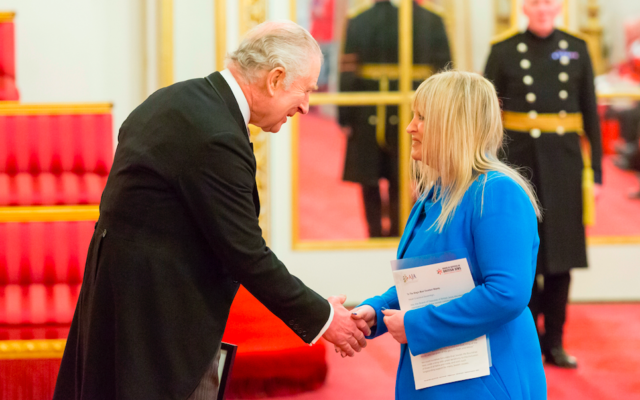OPINION: The loyal address to the new King
As Jews and citizens of this free and democratic country, we should be proud to take our place at the impressive and moving ceremony, writes Vivan Wineman
Last week, I attended a ceremony at Buckingham Palace, where 29 institutions in this country presented an address to the new King, assuring him of their loyalty.
The ability to present such an address is regarded as a privilege; the institutions entitled to do so are therefore known as ‘Privileged Bodies’. Alongside, among others, the Royal Society, the Universities of Oxford and Cambridge the Corporation of London and the Bank of England, the Board of Deputies of British Jews together with the Anglo Jewish Association are such a Privileged Body.
It is generally believed that the Board was formed in 1760 when it presented the Loyal Address to King George III for the first time in that year. In fact, the story is more complicated. The Address was presented, not on behalf of the Board, or even the Jewish community, but by the Sephardi community, or as they referred to themselves, the Nation of Portuguese Jews. Nor was 1760 the first time such an address had been presented. It is pretty clear that an address had been presented on the accession of George II, in 1727 and of George I in 1714. It is even possible, though the evidence is not certain,that an address was presented, on the accession of Queen Anne, in 1702.

What was new in 1760 was not the address, but the reaction of the Ashkenazi community to being left out of it. Whereas on previous occasions they had accepted the position, in 1760, perhaps emboldened by their increasing numbers (they were by now by far the larger community) and their prosperity, the Ashkenazim were furious.
Aaron Frank, one of their members, met with the representatives of the synagogue at Bevis Marks, and after protracted negotiations, an agreement was reached between the Sephardim – self-styled Portuguese Jews, and the Ashkenazim, known as Dutch Jews. The agreement was not to merge, or even to consult, but simply, to keep each other informed and to cooperate on future addresses. Appropriately, perhaps, in view of its later history, the Board began with a broiges (an intra communal row) followed by a settlement which, in true British fashion, was based on pragmatism, not principle, and however, illogical, has endured successfully, for more than two hundred and fifty years.
Very soon differences arose between the two communities as to how assertive Jews should be regarding their rights – an issue which has preoccupied the community throughout its existence. In 1664 Jews had been concerned about the Conventicle Act of that year. This forbade religious gatherings which did not conform to the rites of the church of England. The Act was, in fact, directed not against Jews, but against non-conformists, but the community was concerned that it might cause them difficulties.
On appeal to the Privy Council they were informed that they could continue as long as ‘they demean themselves peaceably and quietly in due obedience to his Majesty’s laws’. In other words Jews were to be tolerated as long as they behaved themselves, and above all showed obedience to the laws of the land.
This concept of conditional tolerance was later described by historians as the emancipation contract. The state granted Jews equal rights, and in return, the Jews undertook to be loyal subjects. Whether such an understanding ever really existed, has been a matter of intense historical debate. It clearly though, no longer applies now. We were happy to take our places at the impressive and moving ceremony, as citizens of this free and democratic country, which has been good to its Jewish community, enjoying our position, as of right and not from the grant of a gracious government.
This applies universally. The appropriately named Universal Declaration of Human Rights enacted by the UN in1948 and followed by similar declarations by the EU and our own Human Rights Act, gives people living in a state the right to vote for the administration that controls their lives and other automatic entitlements such as equal protection of the law.
This applies to Jews and other minorities, Roma, Muslims and Hindus to name but a few and not just in the UK but all around the globe.
Freedom, as has been said, is indivisible.
- Vivian Wineman is a former president of the Board of Deputies.

Thank you for helping to make Jewish News the leading source of news and opinion for the UK Jewish community. Today we're asking for your invaluable help to continue putting our community first in everything we do.
For as little as £5 a month you can help sustain the vital work we do in celebrating and standing up for Jewish life in Britain.
Jewish News holds our community together and keeps us connected. Like a synagogue, it’s where people turn to feel part of something bigger. It also proudly shows the rest of Britain the vibrancy and rich culture of modern Jewish life.
You can make a quick and easy one-off or monthly contribution of £5, £10, £20 or any other sum you’re comfortable with.
100% of your donation will help us continue celebrating our community, in all its dynamic diversity...
Engaging
Being a community platform means so much more than producing a newspaper and website. One of our proudest roles is media partnering with our invaluable charities to amplify the outstanding work they do to help us all.
Celebrating
There’s no shortage of oys in the world but Jewish News takes every opportunity to celebrate the joys too, through projects like Night of Heroes, 40 Under 40 and other compelling countdowns that make the community kvell with pride.
Pioneering
In the first collaboration between media outlets from different faiths, Jewish News worked with British Muslim TV and Church Times to produce a list of young activists leading the way on interfaith understanding.
Campaigning
Royal Mail issued a stamp honouring Holocaust hero Sir Nicholas Winton after a Jewish News campaign attracted more than 100,000 backers. Jewish Newsalso produces special editions of the paper highlighting pressing issues including mental health and Holocaust remembrance.
Easy access
In an age when news is readily accessible, Jewish News provides high-quality content free online and offline, removing any financial barriers to connecting people.
Voice of our community to wider society
The Jewish News team regularly appears on TV, radio and on the pages of the national press to comment on stories about the Jewish community. Easy access to the paper on the streets of London also means Jewish News provides an invaluable window into the community for the country at large.
We hope you agree all this is worth preserving.






















